What happened when a Mad Dog criminal met a fearless cop
It has taken him more than 40 years to talk frankly about how an undercover operation went wrong but when police officer Rob Robertson befriended Australia’s most wanted man, it was quick thinking that saved his life.
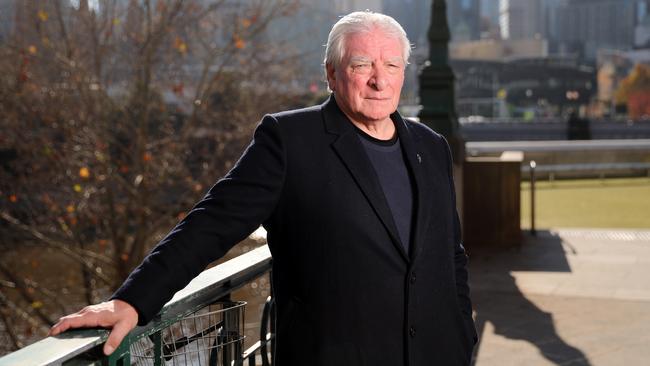
True Crime
Don't miss out on the headlines from True Crime. Followed categories will be added to My News.
Back when the deadliest outlaws in the land robbed armoured cars, pay offices and banks, among the most dangerous things a police officer could do was race to a silent bank alarm flagging a robbery in progress.
It could mean confronting armed robbers wired with adrenaline, ready to shoot their way out of an arrest that would otherwise end with half a lifetime in jail.
Without doubt the most dangerous thing an undercover cop could do was to run with criminals, and so run the risk of being accidentally exposed — or even betrayed by corrupt detectives.
Rob Robertson has been in both situations and lived to tell the tales. It has taken more than 40 years for him to talk about it frankly outside a circle of friends and family.
In both cases, quick thinking saved him. In the undercover operation gone wrong, it also saved the lives of three uniformed police who stumbled into Robertson’s most dangerous undercover assignment, befriending Australia’s most wanted man.
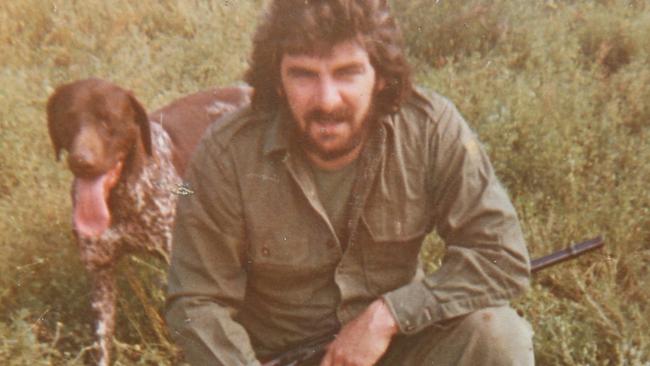
The job came out of the blue. Robertson had been married a month when he got a call from “upstairs”. It was a senior officer, Frank Green.
Green told him a cash guard and an executive from the Mayne Nickless armoured car company had come to him. The guard said he had been approached by a middleman, a Queenslander nicknamed “Bicky”, asking if he was interested in swapping inside information for a percentage of a payroll robbery.
The guard acted interested but developed cold feet before meeting the robbers. Instead, he went to his boss. The result: the honest guard would introduce Robertson, alias “Brian Wilson”, to Bicky and his armed robber friends. That was the beginning of Operation Osprey.
At 34, Robertson had spent most of his adult life outside the force and didn’t look and sound like a typical policeman. The son of a racing writer had gone to school in Essendon with the notorious Moran brothers, Lewis and “Tuppence”, had joined the Army and served in Vietnam in the mid-1960s, and completed six years military service specialising in explosives and firearms.
He’d later worked selling heavy machinery and spare parts before joining the police at 29. He was a keen shooter, at ease around armed men. And he had already been doing surveillance around inner suburban pubs and pool halls and knew how to fit in with crooks and knockabouts.
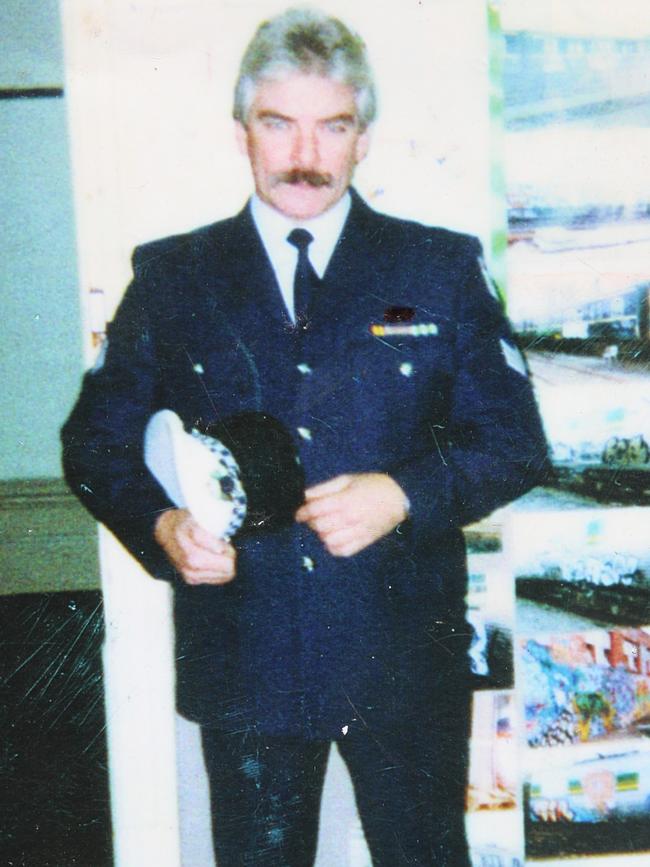
As “Brian Robert Wilson”, rogue security guard, Robertson did a couple of weeks delivering payrolls around the suburbs before getting to meet “Bicky” the middleman in a North Melbourne pub.
Robertson was supplied with a Statesman DeVille V8 to fit the image of a knockabout with expensive habits. He passed the audition with Bicky, whom he describes as “a little fat bloke with the gift of the gab”.
Two days later he met Bicky again at a corner cafe at Victoria Market. He noticed two well-known crooks, Ray Chuck, alias Bennett, and Dennis “Fatty” Smith, walk past the cafe, obviously checking if they knew his face.
Robertson was introduced to “Kelvin” at Werribee races a few days later. He didn’t recognise him as Russell Cox, then on the loose after escaping from the high-security Katingal prison at Long Bay the year before. When they met again in the market cafe three days later, Robertson still wasn’t sure who the robber was but took him seriously.
Robertson sized up the lean, laconic stranger as a formidable opponent who “looked fit and hard”. He knew the robber would be armed. Robertson wasn’t: he had only a “boot knife” for an emergency.
He agreed to take Kelvin and Bicky to look at the target, the Country Roads Board offices in Kew. Kelvin noticed that “Brian” drove with one eye on his mirrors and mentioned it. “I always drive on my mirrors,” the undercover officer retorted.
“Good,” Kelvin said approvingly.
They drove slowly past the CRB building (later renamed VicRoads) in Denmark St.
“This is it,” said Robertson, outlining details of a bumper double payroll coming up to cover back pay for a holiday break.
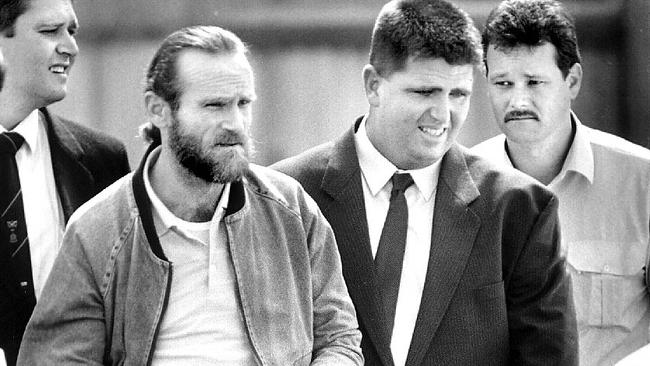
When Robertson stopped at a set of lights, the robber stepped out of the car and vanished into the night.
A few nights later, they returned to Kew. Robertson explained the layout of the building. Luckily, he was telling the truth about the floorplan, because Kelvin interrupted, saying “I know, I’ve already been in and had a look.”
Robertson got the impression that the master crook had put on a dust coat and hard hat to “inspect” the building as if surveying it for maintenance.
They negotiated a “finder’s fee” for “Brian” if the robbery was successful. He demanded 10 per cent with a minimum “hundred grand” and was told, “No problem”.
They met again at night at the same cafe at Victoria Market. Robertson didn’t find it a stretch to play the part of an edgy Mayne Nickless guard dicing with dangerous men, because he was. He knew that now he had passed over the key information, he was redundant, a loose end the robbers might rather kill off than pay off.
Robertson warned Kelvin he’d notified his solicitor that if he didn’t return that night the solicitor was to call police and newspapers and raise the alarm. Kelvin calmly acknowledged the precaution, saying “You’ve thought about this, haven’t you?”
The robber suggested they “go for a walk” to meet Bicky. The pair stood on the street, waiting for Bicky to fetch $5000 cash as a deposit on the guard’s agreed “cut”. Which was fine until a marked police car carrying three uniformed officers happened to drive by. The police stopped when they saw the two men loitering.
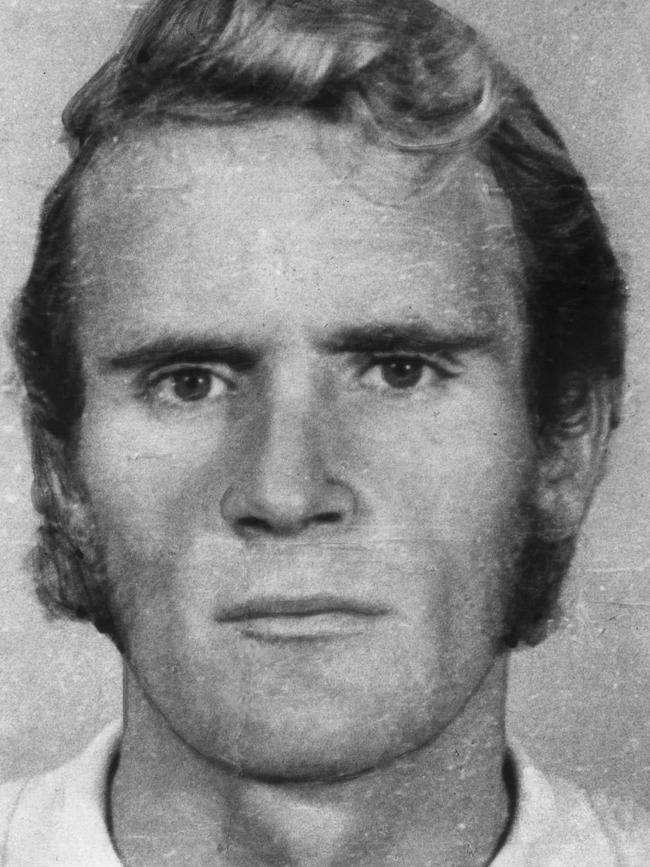
Robertson recognised the officer in the passenger seat, which wasn’t good. He was terrified he might greet him as “Robbo” and so reveal he knew him. If that happened, it could end very badly.
The uniformed officer twigged something was going on. To keep up appearances, he gruffly demanded some “ID” from the pair. Robertson produced his driver’s licence in the name of Brian Wilson. But Kelvin produced a long-barrelled .38 revolver and looked ready to use it.
Robertson feared Kelvin was about to kill the police to prevent arrest and would then kill him because he was a witness. He had to act fast.
“Don’t shoot!” Robertson yelled at the gunman. “We’ll put them in the bin. I’ll take their guns.” He was referring to the heavy dumpster bins used at the market.
Robertson leaned into the car and hissed “Shut your mouth” as he grabbed the policemen’s revolvers before they could react. He and Kelvin dragged them out and shoved them into a bin, slammed the lid and threw pallets on top to hold it down.
Robertson knew that the longer the three stayed in the bin the safer they would be. He threw the pistols and the police radio microphone on to the roof.
Kelvin fired a shot into the air to frighten the binned police and ran off. He called over his shoulder, “You’re a true Briton!” That was the last time Robertson saw him.
It wasn’t until he was going through photographs of known armed robbers in the debriefing later that he identified Kevin as Russell Cox, real name Melville Schnitzerling, Australia’s most wanted.
Although the purely coincidental brush with uniformed police hadn’t compromised the Kew robbery as far as the crooks knew, Cox was spooked. His instinct was high.
He knew, as one sly observer noted, not only “how to commit an armed robbery but when to walk away from one”. Such as at the Queensland railway yards in 1983, when he saw two men in railway uniforms with what he knew was a police dog. It was a stake-out. So Cox vanished, as he did each time right up until Victorian detectives fluked catching him preparing to rob an armoured van at Doncaster Shoppingtown in 1988.
But that was later. Back in 1978, Robertson’s immediate superiors were supposed to “write up” Robertson’s starring role in Operation Osprey. Unfortunately, the paperwork was overlooked. When the necessary reports, in triplicate, did not land upstairs, the legend of unarmed “Robbo” outfoxing “Mad Dog” Cox was confined to the Police Club bar.
It wasn’t the only story about the man who, with Graeme Henderson, was probably the first true undercover Victorian policeman. A year before the Cox caper, Robertson and his then colleague Rod Porter had answered a silent bank alarm in Brunswick while doing surveillance.
Porter entered the bank while Robertson sat outside in their undercover car. When Porter rushed out chased by two armed men pointing guns at him, Robertson drove the car between them and his mate, praying they wouldn’t shoot him through the windows.
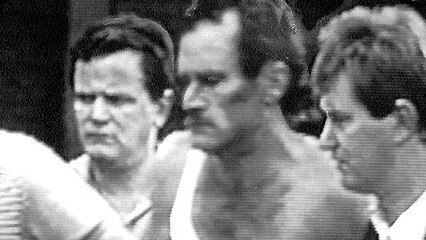
When the bandits escaped in a Holden, he followed at high speed, only to turn a corner and find them pointing guns straight at him.
Robertson stalled the car and thought he was going to die. But the robbers didn’t fire. They bolted and were caught soon after. And another scary story became police lore.
Now, “Robbo” is a grandfather pushing 76. He is physically strong but thoughts of what might have happened on those two brushes with death are never far away. He is still dirty on the bank bandits who threatened him but forgave Russell Cox long ago. Robertson loves dogs, as does Cox, who kept his black labrador Devil (with its own alias, “Butch”) all his time on the run.
“Anyone who likes dogs can’t be all bad,” says the man with whippets in the back yard.
When he heard Cox was finally getting out of Grafton Jail in 2004, he sent him a message through a NSW police friend who had the job of escorting the reformed robber from prison gate to a waiting car.
“Tell him we’re both too old for this crap,” he told the intermediary. Cox’s message came back: “You did a good job.”
Which is exactly what another friend, retired police sergeant John Stubbs, also thinks. “Robbo” long ago assumed the time for official recognition had passed, but Stubbs isn’t copping that. He is quietly pushing for Rob Robertson to receive an award for valour.
A quick look at the Queen’s Birthday honours list suggests his credentials for a “gong” are better than most.

